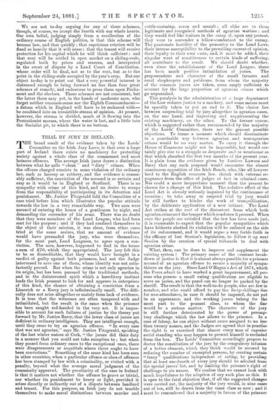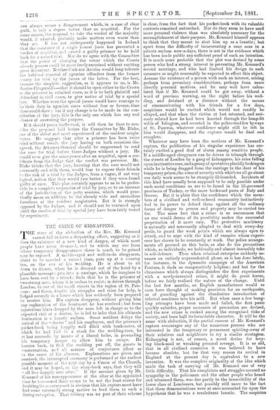TRIAL BY JURY IN IRELAND.
THE broad result of the evidence taken by the Lords'
Committee on the Irish Jury Laws, is that over a large part of Ireland there exists no machinery for protecting society against a whole class of the commonest and most heinous offences. The average Irish juror draws a distinction between what he galls "clean " and " dirty " crimes. When the offence charged consists in some violation of the ordinary law, such as larceny or robbery, and the evidence is reason- ably sufficient, the conviction of the accused is as certain and easy as it would be in England or Scotland. There is no sympathy with crime of this kind, and no desire to escape from the responsibility of participating in its detection and punishment. Mr. Justice Fitzgerald told the Committee of a ease tried before him which illustrates the popular attitude towards the law in a very remarkable way. Two men were accused of entering the house of a gentleman by night, and demanding the surrender of his arms. There was no doubt that they were members of the Land League, who had been sent for the purpose ; and if they had confined themselves to the object of their mission, it was clear, from other cases tried at the same assizes, that no amount of evidence would have persuaded the jury, who were themselves, for the most part, Land Leaguers, to agree upon a con- viction. The men, however, happened to find in the house a sum of £70, which they appropriated. The jury felt this to be so discreditable, that they would have brought in a verdict of guilty against both prisoners, had not the Judge intervened to save one of them, whose identity was not satis- factorily proved. But when the crime is not only agrarian in its origin, but has been pursued by the traditional methods, and in the disinterested spirit which a hereditary instinct leads the Irish peasant to look for and approve in enterprises of this kind, the chance of obtaining a conviction from a Limerick or a Kerry jury is infinitesimally small. The diffi- culty does not arise altogether or mainly from lack of evidence. It is true that the witnesses are often tampered. with and intimidated, but the result is the same when the prisoner has been caught red-handed in the very act. It is impos- sible to account for such failures of justice by the theory put forward by Mr. Justice Barry, that the lower class of jurors are deficient in ordinary intelligence. They are intelligent enough, until they come to try an agrarian offence. "In every case that was not agrarian," says Mr. Justice Fitzgerald, speaking of the last winter assizes at Cork, "the jurors did their duty in a manner that you could not take exception to ; but when they passed from ordinary cases to the exceptional ones, there were disagreements or acquittals where there ought to have been convictions." Something of the same kind has been seen in other countries, when a particular offence or class of offences has been stamped by law with a criminality, or visited with a penalty, beyond what the average moral judgment of the community approved. The peculiarity of the case in Ireland is that it matters not whether the offence be grave or trivial, nor whether its punishment be heavy or light, provided it arises directly or indirectly out of a dispute between landlord and tenant. For this purpose, an Irish jury do not trouble themselves to make moral distinctions between murder and cattle-maiming, arson and assault ; all alike are to them legitimate and recognised methods of agrarian warfare ; and they would feel like traitors in the camp if, upon any pretext, they were to surrender a fellow-combatant to the enemy. The passionate hostility of the peasantry to the Land Laws, their intense susceptibility to the prevailing current of opinion, their loyalty to their own caste, and, it must be added, their singular want of sensitiveness to certain kinds of suffering, all contribute to the result. We should doubt whether, even since the establishment of the Land League, there has been much positive intimidation of juries. The prepossessions and character of the small farmers and rural shopkeepers and publicans, from whom the majority of the common jurors are• taken, seem amply sufficient to account for the large proportion of agrarian crimes which go unpunished.
This paralysis in the administration of a large department of the Law reduces justice to a mockery, and some means must be speedily taken to put an end to it.. The choice lies between suspending trial by jury altogether in agrarian cases, on the one hand, and improving and supplementing the existing machinery, on the other. To the former course, which is suggested rather than recommended by the majority of the Lords' Committee, there are the gravest possible objections. To frame a measure which should discriminate in a practicable way between agrarian and non-agrarian crimes would be no easy matter. To carry it through the House of Commons might not be impossible, but would cer- tainly give rise to a struggle as desperate and as wearisome as that which absorbed the first two months of the present year. It is plain from the evidence given by Justices Lawson and Barry that any such proposal would encounter the almost unanimous opposition of the Irish Bench, who, like all lawyers bred to the English common law, shrink with extreme re- pugnance from the office of judges of fact in criminal cases. Nor could a more inopportune moment than the present be chosen for a change of this kind. The sedative effect of the Land Act is already seriously impaired by the continuance of coercion ; to take away or suspend trial by jury would be still further to hinder the work of tranquillisation, by the deliberate application of a new irritant. The Land Act strikes at the root of the discontent from which both agrarian crime and the temper which condones it proceed. When once the people are satisfied that the law has been made just, it is reasonable to expect that the popular sympathies which have hitherto abetted its violation will be enlisted on the side of its enforcement, and it would argue a very feeble faith in the efficacy of last Session's legislation, to follow it up next Session by the creation of special tribunals to deal with agrarian crime.
What, then, can be done to improve and supplement the existing system ? The primary cause of the constant break- down of justice is that it is almost always possible for a prisoner accused of an agrarian offence to secure a majority of sympa- thisers on the jury. Since Lord O'Hagan's Act of 1871, which the Peers admit to have worked a great improvement, all per- sons who possess a small rating qualification are eligible to serve on juries, and the panel can no longer be packed by the sheriff. The result is that the well-to-do people, who are few in number, and who could afford to pay the forty-shillings fine for non-attendance, in case it should be imposed, do not put in an appearance, and the working jurors belong for the most part to the peasant class, to whom the fine would be a serious matter. The character of the jury is still further deteriorated by the power of peremp- tory challenge which the law allows to the prisoner. In a case of felony, he can object without cause assigned to no less than twenty names, and the Judges are agreed that in practice the right is so exercised that almost every man of superior social standing who may happen to present himself is excluded from the box. The Lords' Committee accordingly propose to doctor the constitution of the jury by the compulsory infusion of a better element, which they think would be secured by reducing the number of exempted persons, by creating certain " fancy " qualifications independent of rating, by providing that at least one-fourth of every jury should be selected from the special jurors' list, and by limiting the prisoner's right of challenge to six names. We confess that we cannot look with much hopefulness to the adoption of any such plan as this. It is open to the fatal objection that, if all the suggested changes were carried out, the majority of the jury would, in nine cases out of ten, still be drawn from the same class as now ; and it must be remembered that a majority in favour of the prisoner can always secure a disagreement which, in a case of clear guilt, is only a degree better than an acquittal. For the same reason, the proposal to take the verdict of the majority would, if adopted, probably make matters even worse than they are. It has not unfrequently happened in Ireland that the resistance of a single honest juror has prevented a verdict of acquittal. and caused a guilty prisoner to be held back for a second trial. Nor do we agree with the Committee that the power of changing the venue which the Courts already possess could be more freely exercised without exciting great discontent. Neither Cork nor Antrim would long tolerate the habitual removal of agrarian offenders from the former county for trial by the jurors of the latter. Far the best, because the simplest. suggestion, as it appears to us, is Mr. Justice Fitzgerald's—that it should be open either to the Crown or the prisoner in criminal cases, as it is to both plaintiff and defendant in civil cases, to give notice of trial by a special jury. Whether even the special jurors would have courage to do their duty in agrarian cases without fear or favour, time alone could show : but if any change is to be made in the con- stitution of the jury, this is the only one which has any real chance of answering the purpose.
If it should prove ineffectual, it will then be time to con- .der the proposal laid before the Committee by Mr. Blake, one of the ablest and most experienced of the resident magis- trates. He suggests that alter a prisoner has been twice tried without result, the jury having on both occasions dis- agreed, the Attorney-General should be empowered to send the case for trial before three Judges without a jury. He would even give the same power after an acquittal, upon a cer- tificate from the Judge that. the verdict was perverse. Mr. Blake thinks that the jury, knowing that the case would not necessarily end with them, would fear to expose their friends to the risk of a trial by the Judges, from a vague, if not very logical, notion that they would fare better if they were found guilty at once. This plan certainly appears to us to be prefer- able to a complete suspension of trial by jury, or to an increase of the jurisdiction of the petty sessions, which would prac- tically mean an addition to the already wide and anomalous functions of the resident magistrates. But it is strongly opposed by the Judges, and it should not be ventured upon until the results of trial by special jury have been fairly tested by experiment.































 Previous page
Previous page